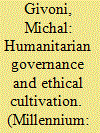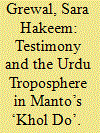| Srl | Item |
| 1 |
ID:
110474


|
|
|
|
|
| Publication |
2011.
|
| Summary/Abstract |
This article seeks to analyse contemporary humanitarianism as an advanced-liberal formation of global governance. It tracks the emergence in the 1970s of the French humanitarian organisation Médecins sans Frontières and shows that its care for and control of distant victims has been commingled with and dependent upon care for Western selves. The article contends that humanitarianism 'without borders' was the outgrowth of the legitimacy crisis of the medical profession, and that its practice of witnessing has ultimately been a mode of ethical self-cultivation by means of which physicians could fashion themselves as more enlightened personae. It further shows that the recent concern with the detrimental side effects of humanitarian action should be deciphered as the culmination of the practices of the self in which global humanitarianism has been embedded since the 1970s.
|
|
|
|
|
|
|
|
|
|
|
|
|
|
|
|
| 2 |
ID:
099981


|
|
|
|
|
| Publication |
2010.
|
| Summary/Abstract |
Engaging with the literature on visual representations of human suffering, being a witness, and trauma, this article discusses visual representations of the 1994 genocide in Rwanda, and especially the art photography of Alfredo Jaar, Robert Lyons, and Jonathan Torgovnik of the aftermath of the genocide. It explores the conditions in which photography can succeed in disrupting stereotypical political interpretations of the killings. Art photography, it is argued, may help transform the viewers from being consuming spectators into being participant witnesses who self-critically reflect upon their own subject positions in relation to the conditions depicted in the image. By discussing photography of the aftermath of the genocide, the article acknowledges the unrepresentability of genocide; by focusing on visual representations, it reflects the extent to which political space is nowadays constituted by means of images; by concentrating on Rwanda, it contributes to the necessary process of examination and self-examination in connection with the killings.
|
|
|
|
|
|
|
|
|
|
|
|
|
|
|
|
| 3 |
ID:
169993


|
|
|
|
|
| Summary/Abstract |
While scholars of Partition frequently reference witnessing as a necessary frame for understanding Partition literature, and particularly the work of Saadat Hasan Manto, I analyse Manto’s short story ‘Khol Do’ (‘Open It’) to argue that the text’s use of Urdu-inflected tropology both deploys and exceeds the discourse of testimony. Through its turn toward magical realism in its devastating ending, ‘Khol Do’ demonstrates both the futility of attempting to definitively fix meaning in the context of unrelenting ambiguity, as well as the vital necessity of Urdu literature in constructing new communities of reading and interpretation in the wake of the ruptures of Partition.
|
|
|
|
|
|
|
|
|
|
|
|
|
|
|
|